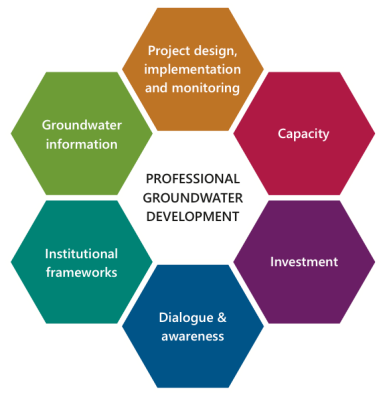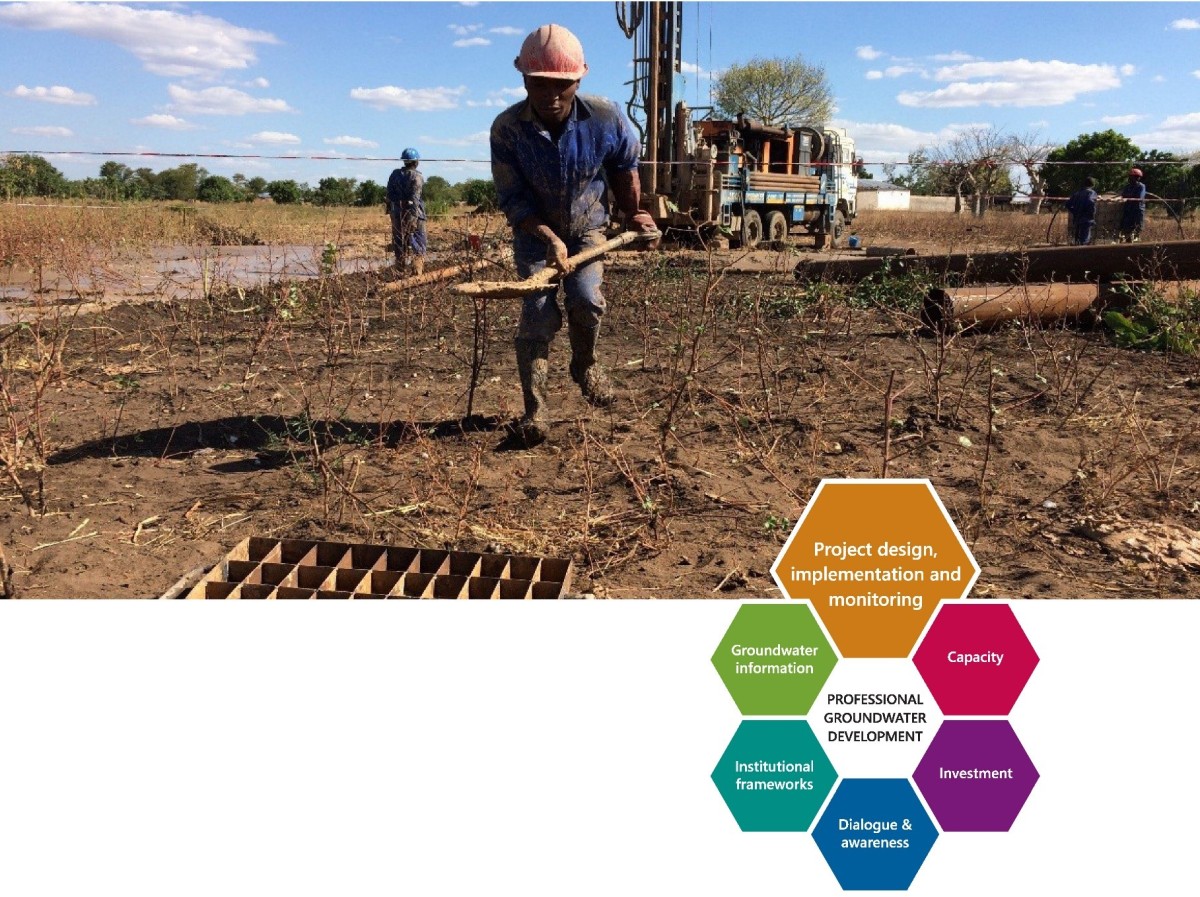This is the fourth and final post in a series of four blogs entitled “Professional Borehole Drilling: Learning from Uganda” written by Elisabeth Liddle, and a RWSN webinar in 2019 about professional borehole drilling. It draws on research in Uganda by Liddle and Fenner (2018). We welcome your thoughts in reply to this blog below.
Great gains have been made in recent years regarding access to improved water sources in rural sub-Saharan Africa. Concerns have been raised, however, over the extent to which these sources are able to provide a reliable and safe water supply in the medium to long term (for example, Foster et al., 2018; Kebede et al., 2017; Owor et al., 2017; Adank et al., 2014).
There has been considerable focus on post-construction operations and maintenance, but increasing attention is on the quality of the implementation to prevent water point failure in the future (UNICEF/Skat, 2016, Bonsor et al., 2015; Anscombe, 2011; Sloots, 2010).
Skat Foundation and UNICEF have been key actors here, jointly advocating for an increase in drilling professionalism across sub-Saharan Africa. They recently released a guidance note on drilling professionalism (UNICEF/Skat, 2016), highlighting six key areas that need to be addressed to increase the quality of implementation work (see Figure 1).
In this blog I focus on the ‘institutional frameworks’ aspect in Figure 1, with specific attention on the ways in which Uganda has sought to improve regulation of the private sector in recent years by introducing licensing systems for both drilling contractors and consultants.



For the past two decades, Uganda has strongly encouraged the involvement of the private sector in the siting and drilling of rural water points (Danert et al., 2003). Having encouraged privatisation, however, the Ministry of Water and the Environment (MWE) recognised that they had a crucial role to play within this: regulation of the private sector. Regulation efforts began in 1999 with the introduction of drilling contractor licenses. To gain a license, drilling contractors must submit documentation outlining their equipment, their staff and CVs, and their work history. Premises and equipment are then assessed, with the drilling contractor’s technical and financial capacity being at the forefront throughout. Drilling contractor licenses must be renewed annually. Updated lists of licensed drilling contractors are published in national newspapers and online every July.
Recent research in Uganda (Liddle and Fenner, 2018) found that drilling contractor licenses have greatly helped the procurement process within Uganda’s implementing agencies, with the drilling contractor license list typically being the first port of call during bid evaluation.
In recent years, MWE recognised the essential need to extend this licensing system to consultants/hydrogeologists, given the proliferation of ‘briefcase consultants’ in the country (those with no formal geology or hydrogeology training). The issue of briefcase consultants is discussed in blog 1 of this series. Briefcase consultants were bidding for the siting and supervision work, yet evaluation teams within implementing agencies had no way of identifying those that were truly qualified for this work, and those whose bidding documents (e.g. work experience, degrees etc) were fake. Poor quality work then proceeded as briefcase consultants began winning contracts.
To address this problem and provide guidance for evaluation teams, the MWE started the process of issuing hydrogeologist/consultant licenses in 2016 (Tindimugaya, 2016). Consultants can apply for an individual hydrogeologist license or a groundwater firm license. For an individual to gain a license, they must submit their academic documents, CV, and an overview of past work. The individual must have hydrogeology specific qualifications (short course, diploma, or degree); geology qualifications alone are insufficient. Premises and equipment are then assessed and a practical assessment and interview are conducted. For a firm to gain a license, the director must gain an individual license. The firm then needs to submit their company registration details, a list of staff and CVs, and details of past work. By July 2018, licenses had been issued to 65 individuals and 15 firms. As with drilling contractor licenses, consultant licenses are renewed annually and updated lists of licensed consultants are published in national newspapers and online every July.
While these licensing systems have greatly helped Ugandan implementing agencies, similar licensing systems across SSA, especially for consultants, appear to be rare. According to Danert and Theis (2018), of the 14 sub-Saharan Africa countries listed in their report, only three had licensing systems in place for consultants, while ten had licensing systems in place for Drilling Contractors. It is now essential that additional sub-Saharan African governments follow Uganda’s lead, and begin the regulate the private sector, especially consultants given the essential role that siting and supervision are known to play when considering the quality of the implementation work (UNICEF/Skat, 2016; Anscombe, 2011; Danert et al., 2010).
What do you think?
So what do you think? Do you have experiences of trying to select qualified and experiences groundwater professionals? Do you think that licensing professionals is the way forward within your context? Are there any efforts to better regulate the private drilling sector in your country? You can respond below by posting in the reply below, or you can join the live webinar on the 14th of May (register here).
References
Adank, M., Kumasi, T.C., Chimbar, T.L., Atengdem, J., Agbemor, B.D., Dickinson, N., and Abbey, E. (2014). The state of handpump water services in Ghana: Findings from three districts, 37th WEDC International Conference, Hanoi, Vietnam, 2014.
Anscombe, J.R. (2011). Quality assurance of UNICEF drilling programmes for boreholes in Malawi. Lilongwe, Malawi: Ministry of Agriculture Irrigation and Water Development, Government of Malawi.
Bonsor, H.C., Oates, N., Chilton, P.J., Carter, R.C., Casey, V., MacDonald, A.M., Etti, B., Nekesa, J., Musinguzi, F., Okubal, P., Alupo, G., Calow, R., Wilson, P., Tumuntungire, M., and Bennie, M. (2015). A Hidden Crisis: Strengthening the evidence base on the current failure of rural groundwater supplies, 38th WEDC International Conference, Loughborough University, UK, 2014.
Danert, K., Armstrong, T., Adekile, D., Duffau, B., Ouedraogo, I., and Kwei, C. (2010). Code of practice for cost effective boreholes. St Gallen, Switzerland: RWSN.
Danert, K. and Theis, S. (2018). Professional management of water well drilling projects and programmes, online course 2018, report for course participants, UNICEF-Skat Foundation Collaboration 2017-2019. St Gallen, Switzerland: Skat.
Danert, K., Carter, R.C., Rwamwanja, R., Ssebalu, J., Carr, G., and Kane, D. (2003). The private sector and water and sanitation services in Uganda: Understanding the context and developing support strategies. Journal of International Development, 15, 1099-1114.
Foster, T., Willetts, J., Lane, M. Thomson, P. Katuva, J., and Hope, R. (2018). Risk factors associated with rural water supply failure: A 30-year retrospective study of handpumps on the south coast of Kenya. Science of the Total Environment,, 626, 156-164.
Kebede, S., MacDonald, A.M., Bonsor, H.C, Dessie, N., Yehualaeshet, T., Wolde, G., Wilson, P., Whaley, L., and Lark, R.M. (2017). UPGro Hidden Crisis Research Consortium: unravelling past failures for future success in Rural Water Supply. Survey 1 Results, Country Report Ethiopia. Nottingham, UK: BGS (OR/17/024).
Liddle, E.S. and Fenner, R.A. (2018). Review of handpump-borehole implementation in Uganda. Nottingham, UK: BGS (OR/18/002).
Owor, M., MacDonald, A.M., Bonsor, H.C., Okullo, J., Katusiime, F., Alupo, G., Berochan, G., Tumusiime, C., Lapworth, D., Whaley, L., and Lark, R.M. (2017). UPGro Hidden Crisis Research Consortium. Survey 1 Country Report, Uganda. Nottingham, UK: BGS (OR/17/029).
Sloots, R. (2010). Assessment of groundwater investigations and borehole drilling capacity in Uganda. Kampala, Uganda: Ministry of Water and Environment, Government of Uganda, and UNICEF.
Tindimugaya, C. (2016). Registration of groundwater consultants in Uganda: rationale and status. RWSN Forum, 2016, Abidjan, Côte d’Ivoire.
UNICEF/Skat (2016). Professional water well drilling: A UNICEF guidance note. St Gallen, Switzerland: Skat and UNICEF.

